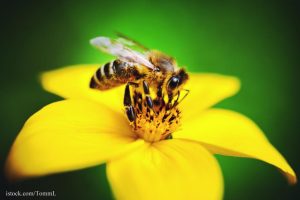President Obama has created a federal strategy to promote the health of honey bees and other pollinators that are crucial to our food supply. In the last few decades, the environment has lost a significant number of pollinators, including honey bees, native bees, birds, bats, and butterflies. Honey bees alone pollinate 1/3 of our food crops.
 Bee colony collapse is a serious problem that Food Poisoning Bulletin has been covering for years. Scientists believe that neonicotinoids, a type of pesticide, are one cause of this problem. Severe yearly declines are decimating the industry, and the commercial pollination industry may be fatally injured.
Bee colony collapse is a serious problem that Food Poisoning Bulletin has been covering for years. Scientists believe that neonicotinoids, a type of pesticide, are one cause of this problem. Severe yearly declines are decimating the industry, and the commercial pollination industry may be fatally injured.
A Pollinator Health Task Force will be established, headed by the Secretary of Agriculture and the Administrator of the EPA. The mission and function of the task force will be to develop a National Pollinator Health Strategy that will include a pollinator research action plan, public education plans, and public-private partnerships to protect pollinators and increase the quality and amount of habitat.
Increasing and improving pollinator habitats will include facility landscaping, educational gardens, increased native vegetation, and incorporating pollinator health as a component of all future restoration and reclamation projects. The Army Corps of Engineers will incorporate conservation practices, and the Department of Defense will support habitat restoration projects and will direct military installations to include pollinator-friendly native landscaping, as well as minimizing the use of pesticides. Most importantly, the EPA will assess the effect of pesticides, including neonicotinoids, on bee and other pollinator health and take action to protect pollinators.
EcoWatch.org applauds these efforts and action. Jay Feldman, executive director of Beyond Pesticides, said in a statement, “today, President Obama set a precedent, elevating the plight of our nation’s pollinators by acknowledging not only their important to our economy, but directing federal agencies to be leaders in finding meaningful solutions to our current pollinator crisis.”
But environmental activists are still critical of the EPA’s lack of action on this issue. The EPA has released two new tools to protect pollinators, but “the agency still falls short of restricting the harmful systemic pesticides that are linked to bee decline,” according to EcoWatch. Beyond Pesticides, Center for Food Safety, and others filed a lawsuit against the EPA last year on its continued registration of neonicotinoids and other pesticides linked to bee colony collapse disorder.




